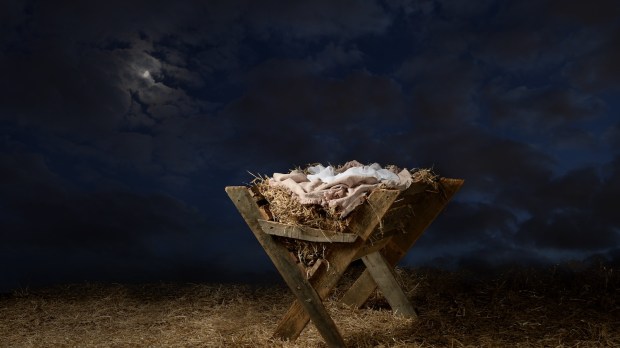This is how we respond to the coming of Jesus Christ at Christmas.
Darkness and Dependency
We cannot help ourselves — we go out to meet Jesus in the darkness. It doesn’t matter how murky, or dismal, or bleak the darkness may be — we venture forth into it filled with anticipation because we won’t delay greeting our Emmanuel. The Church even celebrates a special “Mass During the Night” to accommodate this fervent desire of the faithful.
We dare to believe the angel who declares to the shepherds, “You will find an infant wrapped in swaddling clothes and lying in a manger.” Despite how implausible it seems, we believe that God will act and show himself in this most unexpected, surprising, even scandalous manner. It is not for us to decide how God will come to us. Our responsibility is simply to accept this “sign for you” and to hurry to that place so that we “will find an infant.”
And there we will encounter dire poverty, squalor, and need. We behold dependency incarnate. But it does not repel us; it endears us. Our Savior comes to us as a beggar.
Going and Giving
Perhaps the shepherds expected that “the glory of the Lord” which “shown around them” when the angel appeared to them would also shine around “Christ and Lord” in Bethlehem. But there is no splendor, no majesty to behold. They — and we — come into the presence of pure humility, of lowliness only. And we cannot but marvel at the paradox of his littleness: One who is untellably great has become so small, has lowered himself almost to oblivion.
Our immediate response is to show him tender love and affection, for the Son of God comes to us as a baby, and babies bring out the best in us. They make us hold back nothing in expressing our love. We dote on the baby Jesus because we find him adorable.
Also like the shepherds, who even leave their sheep behind to go and worship the Christ child, we go with all haste, letting nothing stand in the way. Like the Magi, we are moved to give him precious gifts — maybe not gold, frankincense, and myrrh, but gifts that express the depth of our love and thankfulness that God’s own Son dwells in our midst.
How Jesus Responds to Us
The astonishing thing is this: The way that we act toward Jesus as a baby mirrors the very way that Jesus will act toward us when he becomes an adult. The same seven actions mark the manner in which Jesus redeems us as our Savior.
Jesus will come to us in the darkness of our sin, our doubt, our powerlessness. In Christ, “the people dwelling in darkness have seen a great light” (Mt 4:16). The Lord acts mercifully so that people “may turn from darkness to light and from the power of Satan to God, so that they may obtain forgiveness of sins” (Act 26:18).
Jesus comes to us in our destitution. We are nothing but needy before him, standing in his presence like a beggar … and doing so with confidence! Jesus’ first words are endearing words of preference for us in that state: “Blessed are the poor in spirit” (Mt 5:3).
The littleness that Jesus models emboldens us not to be scandalized at the sight of our own littleness. What distinguishes true Christian holiness is remaining small and humble. “I am content with weakness. For when I am powerless, it is then that I am strong” (2 Cor 12:10).
The response of total love we show toward the baby Jesus is the constant response of love that Jesus gives to us. That is how our Savior sees us! At the core of Christ’s preaching will be the call for us to do what he himself does at Christmas: “Unless you change and become like little children, you will never enter the kingdom of heaven” (Mt 18:3).
Jesus comes to us — not to worship, but — to lead us into perfect worship. Christ the Good Shepherd will leave behind the 99 sheep to seek us out when we are lost. The gifts that Jesus gives outrank even the magnificence of the Magi’s: Jesus will give us the love of his Father, his Word, his Blessed Mother, his flesh to eat, his friendship, his peace, his Holy Spirit.
It all seems implausible, impossible — that God would act in such a surprising, startling, unimaginable way. But that is his way. The mystery of the manger has taken an unfathomable turn: In Holy Communion, the Body of Christ now is “reposed” in the most unlikely of places — ourselves.
O come, let us adore Him!
~
Find Fr. Peter John Cameron’s reflection on the Sunday Gospel each week here.
Find his series of brief reflections on prayer here.
And his new series on the Eucharist here.

